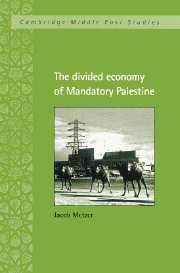Crossref Citations
This Book has been
cited by the following publications. This list is generated based on data provided by Crossref.
Ingram, Paul
and
Simons, Tal
2000.
State Formation, Ideological Competition, and the Ecology of Israeli Workers' Cooperatives, 1920–1992.
Administrative Science Quarterly,
Vol. 45,
Issue. 1,
p.
25.
Golan, Arnon
2001.
European Imperialism and the Development of Modern Palestine: Was Zionism a Form of Colonialism?.
Space and Polity,
Vol. 5,
Issue. 2,
p.
127.
Bareli, Avi
2001.
Forgetting Europe: Perspectives on the debate about Zionism and colonialism.
Journal of Israeli History,
Vol. 20,
Issue. 2-3,
p.
99.
PFEIFER, KAREN
2003.
The material basis of Palestinian Society: A long-term perspective.
Critique: Critical Middle Eastern Studies,
Vol. 12,
Issue. 2,
p.
103.
Gal, John
2005.
Business and Social Policy: A Case Study of the Adoption of Workers’ Compensation in Israel.
Social Service Review,
Vol. 79,
Issue. 1,
p.
29.
Okun, Barbara S.
and
Friedlander, Dov
2005.
Educational stratification among Arabs and Jews in Israel: Historical disadvantage, discrimination, and opportunity.
Population Studies,
Vol. 59,
Issue. 2,
p.
163.
Berg, Gerald M.
2006.
Zionist Women of the 1920s: The Voice of Nation Building.
Journal of Israeli History,
Vol. 25,
Issue. 2,
p.
313.
Last, David M.
2007.
Economic Peace-Building to Support Israeli-Palestinian Disengagement: A Discussion Paper.
SSRN Electronic Journal,
Abramitzky, Ran
2008.
The Limits of Equality: Insights from the Israeli Kibbutz*.
Quarterly Journal of Economics,
Vol. 123,
Issue. 3,
p.
1111.
Karlinsky, Nahum
2008.
Jewish philanthropy and Jewish credit cooperatives in Eastern Europe and Palestine up to 1939: A transnational phenomenon?.
Journal of Israeli History,
Vol. 27,
Issue. 2,
p.
149.
BERNSTEIN, DEBORAH
and
HASISI, BADI
2008.
‘Buy and promote the national cause’: consumption, class formation and nationalism in Mandate Palestinian society1.
Nations and Nationalism,
Vol. 14,
Issue. 1,
p.
127.
Booth, Anne
2008.
The Economic Development of Southeast Asia in the Colonial Era:c.1870–1942.
History Compass,
Vol. 6,
Issue. 1,
p.
25.
Metzer, Jacob
2008.
Jewish immigration to Palestine in the long 1920s: An exploratory examination.
Journal of Israeli History,
Vol. 27,
Issue. 2,
p.
221.
Kalev, Alexandra
Shenhav, Yehouda
and
De Vries, David
2008.
The State, the Labor Process, and the Diffusion of Managerial Models.
Administrative Science Quarterly,
Vol. 53,
Issue. 1,
p.
1.
Franck, Raphaël
and
Krausz, Miriam
2009.
Institutional changes, wars and stock market risk in an emerging economy: evidence from the Israeli stock exchange, 1945–1960.
Cliometrica,
Vol. 3,
Issue. 2,
p.
141.
Gal, John
and
Bargal, David
2009.
Labor Welfare in Israel.
Journal of Workplace Behavioral Health,
Vol. 24,
Issue. 1-2,
p.
185.
Shafir, Gershon
2011.
CAPITALIST BINATIONALISM IN MANDATORY PALESTINE.
International Journal of Middle East Studies,
Vol. 43,
Issue. 4,
p.
611.
Knight, John
2011.
Securing Zion? Policing in British Palestine, 1917–39.
European Review of History: Revue europeenne d'histoire,
Vol. 18,
Issue. 4,
p.
523.
Cohen, Michael J.
2011.
Zionism and British imperialism II: Imperial financing in Palestine.
Journal of Israeli History,
Vol. 30,
Issue. 2,
p.
115.
Roberts, Nicholas E.
2011.
Re-Remembering the Mandate: Historiographical Debates and Revisionist History in the Study of British Palestine.
History Compass,
Vol. 9,
Issue. 3,
p.
215.



